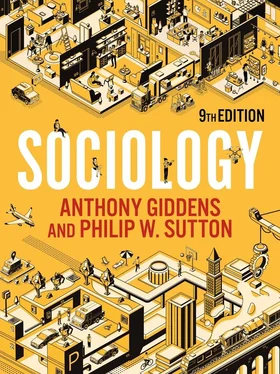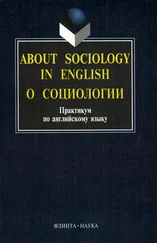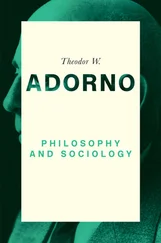Sociology has developed as a discipline in which we set aside our personal view of the world in order to look more carefully at the influences that shape our lives and those of others. Sociology emerged as a distinct intellectual endeavour with the development of modern societies, and the study of such societies remains a central concern. However, in an increasingly interconnected global world, sociologists must take a similarly global view of their subject matter if they are properly to understand and explain it. During the founding period of sociology, society’s central problems included social class conflict, wealth distribution, the alleviation of poverty, and the question of where the process of modernization was headed.
In the contemporary period most of these issues remain, but it may be argued that sociology’s central problems are shifting. Today there are also other issues such as rapid globalization, international terrorism, health pandemics, environmental damage, global risks with potentially grave consequences, multiculturalism and gender inequality. This means that sociologists have to question whether the theories designed to grasp problems of an earlier period still have any purchase on the new issues of today. If not, then we will need to design new theories that are better able to perceive what Karl Mannheim once called ‘the secret of these new times’. The ongoing debate about the status and continuing relevance of the classical sociological theories runs throughout this book.
Sociology is not just an abstract intellectual field but has practical implications for people’s lives, and learning to become a sociologist should not be a dull or tedious endeavour. The best way to make sure it does not become so is to approach the subject in an imaginative way and to relate sociological ideas and findings to situations in your own life. In that way, you should learn important things about yourself as well as better understanding social life, societies and the wider human world.
 Chapter review
Chapter review
1 What aspects mark out the sociological imagination as different from the perspective of the individual person? What is sociology’s main subject matter?
2 What were the social, economic and political problems that the early sociologists sought to understand and solve?
3 List the main contributions made to the founding of sociology by Auguste Comte, Karl Marx, Emile Durkheim and Max Weber. What assumptions about societies are shared by all four and in what ways do their perspectives diverge?
4 Theoretical disputes are difficult to resolve even in the natural sciences, but what makes them peculiarly problematic in sociology?
5 Outline the three central theoretical traditions in Euro-American sociological theory. Is it fair to suggest that sociology needs all three if it is to be successful, or does one tradition have a better grasp of social reality? What issues have risen to prominence since the latter part of the twentieth century that none of the three traditions has adequately incorporated?
6 Using examples of ethnicity or gender, explain how micro and macro levels of social life are connected. What is meant by the meso level of social reality?
7 What are the practical implications and applications of sociological research? List the ways in which sociology can make a valuable contribution to improving social life.
8 Should sociologists become more involved in political debates in order to influence policies or should they just get on with their research and let others decide how their findings should be used? Can you think of any reason why sociologists might withhold their findings for political reasons? Should they?
 Research in practice
Research in practice
We have seen that the concept of emotional labour was developed initially by Arlie Hochschild from within the symbolic interactionist tradition. Workers who engage in emotional labour often say that it is exhausting. But why is this the case? Sechelski and Story (2018) look into this issue in relation to academic advisors in the USA.
Read their article online and try the questions that follow:
Sechelski, A. N., and Story, C. V. (2018) ‘So This is Why I’m Exhausted: Emotional Labor Explained’, Academic Advising Today , 41(2); www.nacada.ksu.edu/Resources/Academic-Advising-Today/View-Articles/So-This-Is-Why-Im-Exhausted-Emotional-Labor-Explained.aspx.
1 What kind of research is this? Where do the researchers gather their evidence from?
2 In relation to emotional labour, what is meant by ‘surface acting’ and ‘deep acting’?
3 Why do the authors say the deep acting is less exhausting than surface acting?
4 What can the advisors do to avoid exhaustion and ‘burnout’? Do you agree with the authors’ conclusions?
 Thinking it through
Thinking it through
Sociological theories have long been distinguished from each other by their focus primarily on social structure or human agency or the extent to which people are shaped by their society, or vice versa. Anthony Giddens suggests that the process of structuration helps us to avoid focusing on either structure or agency. Examples we provide in the chapter are the way that communist regimes collapsed in the late 1980s and the 1990s and popular uprisings across the Middle East and North Africa in 2011–12 challenged the existing authorities.
Do your own research into both sets of events. What are the main similarities and differences between these historical revolts and their eventual outcomes? Can we say that there is always scope for changing the existing social structure? Are social structures really as malleable as structuration theory says? Does structuration theory pay too little attention to the power of existing authorities to resist radical change from below?
 Society in the arts
Society in the arts
Read the following statement carefully.
… to speak of art and social theory as equal partners is to say that art represents a source of existential social knowledge that is of its own worth and is not inferior to the knowledge of social science. It is to say that there are certain things that art can tell us about society that social science cannot tell us … Novels, plays, films, paintings and drawings tell us different things about social life from the things a piece of social scientific research can tell us about social life, and to the extent that they tell us these different things, they tell us more things . (Harrington 2004: 3)
Consider a novel, play, film, painting or other work of art you have recently read, seen or heard. What does this work tell us about social life that is a) different from what sociology tells us and b) more than sociological knowledge? Can the knowledge provided by the work be compared to social scientific findings or are they just incommensurable?
 Further reading
Further reading
For those who are new to sociology, Zygmunt Bauman and Tim May’s (2019) Thinking Sociologically (3rd edn, Chichester: Wiley Blackwell) is an up-to-date guide to developing and using your sociological imagination, with many everyday examples. Something closer to a personal view of sociology can be found in Richard Jenkins’s (2002) Foundations of Sociology: Towards a Better Understanding of the Human World (Basingstoke: Palgrave Macmillan), which explores the role of sociology and sociologists in an age of globalization.
Читать дальше

 Chapter review
Chapter review Research in practice
Research in practice Thinking it through
Thinking it through Society in the arts
Society in the arts Further reading
Further reading










